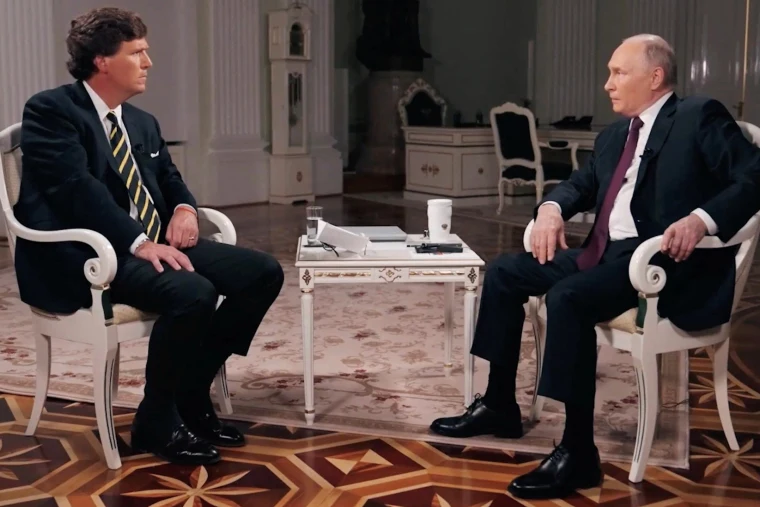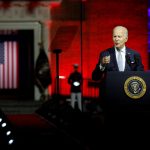The Tucker Carlson interview with Vladimir Putin underscores the significance of X, formerly known as Twitter, and the broader principles of free speech championed by Elon Musk. In a time of heightened geopolitical tensions and media scrutiny, the ability to engage in open dialogue and the exchange of ideas becomes paramount.
Ep. 73 The Vladimir Putin Interview pic.twitter.com/67YuZRkfLL
— Tucker Carlson (@TuckerCarlson) February 8, 2024You do not have to believe one word Putin said, but the right for Americans to hear it is fundamental to the values of the USA.
The interview, which garnered significant attention and controversy, exemplifies the power of independent media outlets and digital platforms in facilitating unfiltered communication between world leaders and the public. By providing a platform for diverse perspectives and uncensored discourse, X plays a crucial role in promoting transparency and accountability in global affairs.
Elon Musk’s involvement in the discussion further highlights the intersection of technology, media, and free speech. As a vocal advocate for internet freedom and decentralization, Musk’s support for platforms like X reinforces the importance of preserving avenues for open expression and challenging mainstream narratives.
Moreover, the Tucker Carlson interview serves as a reminder of the inherent value of free speech in democratic societies. In an era marked by increasing censorship and political polarization, the protection of free speech rights is essential to fostering informed debate, fostering democratic participation, and safeguarding individual liberties.
Ultimately, the exchange between Tucker Carlson and Vladimir Putin underscores the vital role of platforms like X and advocates like Elon Musk in promoting free speech and facilitating meaningful dialogue on issues of global significance. As debates around media censorship and freedom of expression continue to evolve, it is imperative to uphold these fundamental principles as cornerstones of democratic governance.
The intersection of free speech, government accountability, and media censorship has become increasingly contentious in recent years, particularly in the context of the Biden and Obama administrations. Revelations from sources like WikiLeaks and internal documents from platforms like Twitter have shed light on the abuse of censorship to push propaganda and shape public discourse, raising concerns about the erosion of free speech rights in America.
The Obama and Biden administrations have faced criticism for their handling of whistleblowers and journalists who expose government misconduct. WikiLeaks, for example, made headlines with its release of classified documents exposing military and diplomatic secrets, prompting fierce condemnation and legal action from the government. The aggressive pursuit of whistleblowers like Chelsea Manning and Edward Snowden sent a chilling message to those who sought to hold the government accountable for its actions.
In addition to targeting whistleblowers, the Obama and Biden administrations have been accused of using censorship to control the narrative and suppress dissenting voices. Internal documents from platforms like Twitter have revealed coordinated efforts to silence political opponents and manipulate public opinion. These revelations have raised serious questions about the integrity of the democratic process and the role of social media in shaping public discourse.
The abuse of censorship for political gain is a dangerous precedent that threatens the foundation of free speech in America. By weaponizing platforms like Twitter to push propaganda and suppress dissent, the government undermines the principles of transparency and accountability that are essential to a functioning democracy. The silencing of whistleblowers and journalists not only stifles public debate but also erodes trust in government institutions and the media.
As advocates for free speech continue to push back against censorship and government overreach, the fight to protect First Amendment rights remains ongoing. The lessons of WikiLeaks and the Twitter files serve as a stark reminder of the importance of vigilance in defending free speech and holding those in power accountable for their actions. In an era of increasing censorship and political polarization, the preservation of free speech rights is more critical than ever to safeguarding democracy and upholding the principles of liberty and justice for all.
As the political landscape in the United States becomes increasingly polarized, the controversy surrounding the Hunter Biden laptop has taken center stage, with Democrats facing accusations of deception and dishonesty. The emergence of Hunter Biden’s laptop and the subsequent handling of its contents have ignited a firestorm of debate, revealing the complexities of modern politics and the power struggles between opposing factions.
The Hunter Biden laptop saga began in October 2020 when the New York Post published a bombshell report alleging that emails found on a laptop belonging to Hunter Biden implicated his father, Joe Biden, in corrupt business dealings with foreign entities. The emails purportedly raised questions about the extent of Joe Biden’s involvement in his son’s business affairs and suggested potential conflicts of interest during his time as Vice President.
In response to the explosive allegations, Democrats swiftly moved to discredit the story, dismissing it as Russian disinformation and baseless conspiracy theories. Prominent Democrats, including Joe Biden himself, labeled the laptop story as a smear campaign orchestrated by political opponents to undermine his presidential bid. The narrative pushed by Democrats sought to delegitimize the laptop’s contents and deflect attention away from its potentially damaging implications.
However, as more information emerged and corroborating evidence came to light, the credibility of the laptop story began to grow. Forensic analysis of the laptop’s hard drive confirmed the authenticity of the emails, casting doubt on the Democrats’ narrative of Russian disinformation. Despite attempts to downplay its significance, the Hunter Biden laptop continued to haunt the Biden administration, fueling speculation about ethical lapses and potential wrongdoing.
The Democrats’ handling of the Hunter Biden laptop controversy has raised serious questions about their commitment to transparency and accountability. By dismissing legitimate concerns and resorting to accusations of conspiracy, Democrats have undermined public trust in the political process and fueled perceptions of elitism and corruption within the establishment.
Moreover, the Democrats’ refusal to acknowledge the implications of the laptop’s contents has fueled speculation about their motives and intentions. Critics argue that the Democrats’ willingness to downplay the story reflects a broader pattern of dishonesty and manipulation aimed at protecting their political interests at all costs.
As the debate over the Hunter Biden laptop continues to unfold, it serves as a stark reminder of the challenges facing American democracy in an era of hyperpartisanship and media polarization. The controversy highlights the need for greater transparency and accountability in government and underscores the importance of holding elected officials accountable for their actions. Only through open dialogue and honest engagement can the United States hope to overcome its deep political divisions and restore faith in its democratic institutions.
Shayne Heffernan









